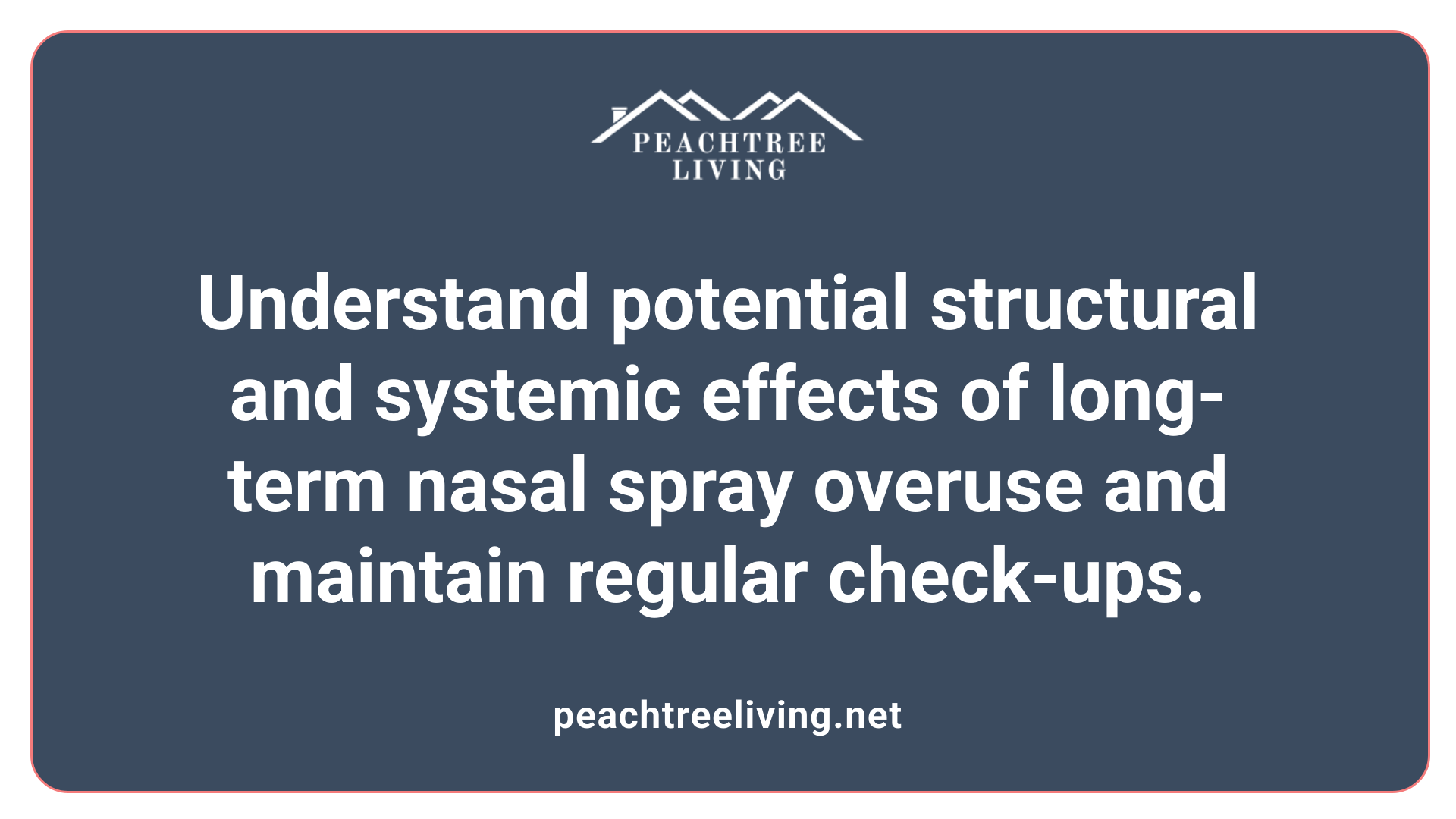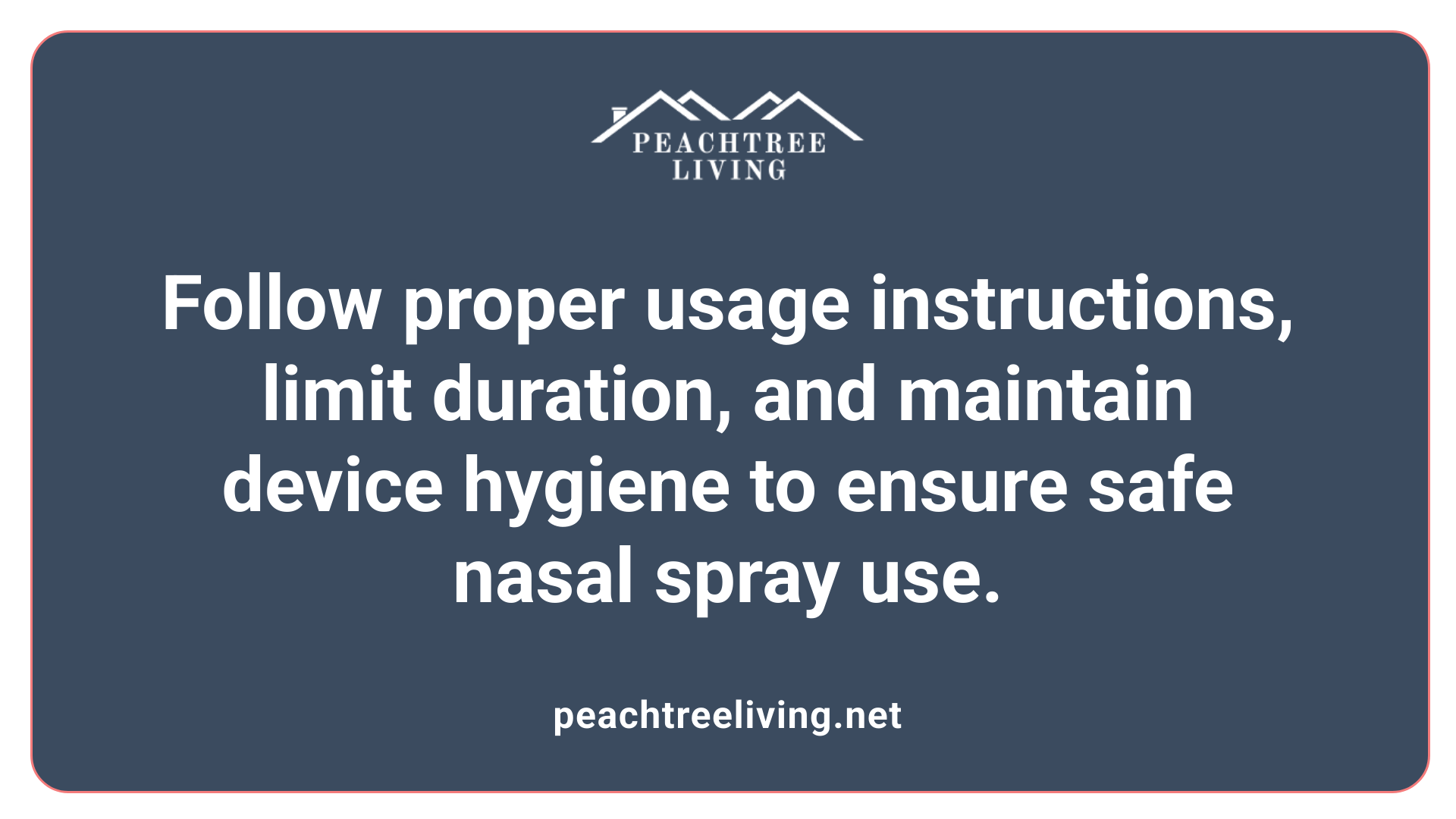Introduction to Nasal Spray Use and Concerns
Nasal sprays are commonly used remedies for allergy relief, nasal congestion, and inflammation. While many formulations are safe and effective when used properly, concerns about dependency, overuse, and long-term health effects have gained attention. This article explores whether nasal sprays can be addictive, the risks associated with overuse, and guidelines for safe and effective management.
Types of Nasal Sprays and Their Functions
Are nasal steroids like Flonase safe for daily use and not addictive?
Nasal steroids such as Flonase, Nasonex, and Nasacort are popular treatments for allergy symptoms and are considered safe for daily use by most individuals. These sprays contain corticosteroids that reduce inflammation in the nasal passages, providing relief from nasal congestion, sneezing, and other allergy-related issues. Unlike decongestant sprays, which can cause rebound congestion when used excessively, steroid nasal sprays do not typically lead to dependence or addiction. They do not cause long-term changes to nasal tissues when used appropriately and are safe for prolonged use under medical supervision. Common side effects are mild, including nosebleeds, which may occur if the spray is improperly administered. Overall, nasal steroid sprays offer a safe, effective, and non-addictive option for those managing persistent allergy symptoms, especially when used as directed.
What are the risks of overusing nasal sprays?
Overusing nasal sprays, particularly medicated decongestant types such as Afrin or Sinex, carries significant risks. Excessive use of decongestant sprays can lead to rebound congestion, medically known as rhinitis medicamentosa. This condition causes nasal passages to become increasingly swollen after stopping the spray, resulting in a vicious cycle where users continually apply more spray to temporarily relieve symptoms. Rebound congestion can worsen over time and last for months if the overuse continues, impairing normal breathing and causing discomfort. Additionally, overuse may damage the nasal mucosa, leading to dryness, irritation, or even tissue atrophy. Frequent or prolonged use of decongestant sprays can also cause nosebleeds, infections, and atrophic rhinitis, sometimes called 'stinky nose', characterized by crusting and foul odor. To prevent these issues, it is crucial to limit the use of medicated sprays to no more than three days unless directed by a healthcare professional. Alternative options such as saline sprays, nasal steroids, or mechanical methods like nasal irrigation are recommended for ongoing symptom relief.
Can the use of nasal sprays lead to dependence or addiction?
Yes, dependence can develop from the overuse of certain nasal sprays, mainly due to rebound congestion. When decongestant sprays like Afrin or Neosynephrine are used beyond the recommended duration, typically more than three days, they can induce a phenomenon called rhinitis medicamentosa. This condition causes persistent nasal congestion, dryness, and swelling, which compels users to apply more spray to relieve discomfort. Over time, this creates a cycle of reliance where stopping the spray leads to worsening congestion, and the person feels psychologically dependent on the spray to breathe. While these sprays are not addictive in the traditional sense—meaning they do not cause cravings—they can lead to physical dependence through the rebound effect. Managing dependence often requires medical guidance to safely taper off the spray, switch to alternative treatments like nasal steroids or saline sprays, and restore normal nasal function.
How can I identify signs of overuse or dependency on nasal sprays?
Recognizing overuse or dependency involves observing certain symptoms and behaviors. Indicators include:
- Continuous or worsening nasal congestion after stopping the spray.
- Using the spray longer than the advised 3-5 days.
- Needing to use more of the spray over time to achieve the same relief.
- Experiencing nasal dryness, irritation, or nosebleeds.
- Feeling anxious or distressed if unable to use the spray.
- Developing a cycle of relief and rebound congestion, making it difficult to breathe without the spray.
- Experiencing physical changes such as nasal tissue damage or thickening of the nasal walls. Persistent symptoms and reliance on the spray beyond the recommended duration indicate potential overuse or dependence. To prevent complications, always adhere to usage guidelines and consult with healthcare professionals if symptoms persist or worsen.
Long-term Effects of Prolonged Use of Nasal Sprays

What are the long-term effects of prolonged nasal spray use?
Long-term use of nasal sprays can lead to various health issues depending on the type of spray and how it is used. One common concern is with nasal decongestant sprays like oxymetazoline (e.g., Afrin) and phenylephrine. When these sprays are used beyond the recommended period of no more than three days, they can cause rebound congestion, a condition known as rhinitis medicamentosa. This condition manifests as increasing nasal swelling and blockage, often leading to a dependence cycle where users feel compelled to keep using the spray to relieve congestion.
Rebound congestion occurs because the nasal blood vessels become increasingly reactive and swollen after overuse, which worsens congestion once the medication wears off. It can result in a persistent cycle of worsening symptoms that are difficult to break without medical intervention.
Chronic overuse can also cause structural changes in the nasal passages. These include thinning of nasal tissues, atrophic rhinitis, and formation of nasal crusts. Atrophic rhinitis, sometimes called 'stinky nose,' involves atrophy of the nasal mucous membranes, crust formation, and a foul odor. Prolonged decongestant spray use may also lead to physical changes such as a deviated septum or hypertrophy of the turbinates, which can be confirmed through nasal scans and examinations.
Additionally, continuous overuse of sprays containing pseudoephedrine or similar agents may cause systemic effects like increased blood pressure, headache, and nasal tissue damage due to the harsh vasoconstrictive action.
In contrast, nasal steroid sprays such as fluticasone (Flonase) or mometasone (Nasonex) have a much safer long-term profile when used correctly. These corticosteroid sprays are primarily used to manage nasal allergies and, when used as directed, rarely cause severe local or systemic side effects. Minimal risks include nasal dryness, nosebleeds, or local infections like nasal candidiasis. In children, growth suppression is a concern only when high doses are used over extended periods, which is uncommon with proper medical supervision.
Saline nasal sprays stand out as the safest option for continuous use. They are drug-free, non-addictive, and predominantly used for nasal irrigation and moistening nasal passages, with no significant side effects.
Safety profile of steroid nasal sprays
Steroid nasal sprays are generally considered safe for prolonged usage, especially under medical guidance. They effectively reduce inflammation caused by allergies and do not cause rebound congestion or dependency, unlike decongestant sprays.
Most local side effects, if they occur, are mild and include nasal dryness, irritation, or minor nosebleeds. Rarely, long-term, high-dose use may increase the risk of nasal infections or, very rarely, affect the eye and cause cataracts or increase intraocular pressure. Regular check-ups and adherence to prescribed doses serve to mitigate these risks.
Risks of long-term overuse and proper monitoring
While steroid nasal sprays are safe for long-term management of allergies, overuse or improper application techniques can lead to complications like nasal mucosa dryness or minor bleeding. It is crucial for individuals to follow their healthcare provider’s instructions regarding dose and duration.
For decongestant sprays, longer use introduces serious risks such as rhinitis medicamentosa, nasal tissue damage, and possible structural changes in the nasal cavity. Preventative measures include limiting use to no more than three days and consulting healthcare professionals if symptoms persist.
Monitoring health during long-term therapy involves regular medical check-ups, especially in children and those with underlying health conditions. Such oversight helps ensure that treatment remains effective and safe, minimizing adverse effects while optimizing relief from nasal congestion.
In summary, understanding the differences between the types of nasal sprays and adhering to recommended usage guidelines greatly reduces health risks associated with long-term use. Proper diagnosis, medical guidance, and adherence to treatment protocols are essential for maintaining nasal and overall health.
Guidelines for Safe Use of Nasal Sprays

What guidelines should be followed for safe nasal spray use?
Using nasal sprays responsibly is crucial to avoid side effects, dependence, and potential damage to your nasal passages. Always follow the instructions that come with your medication, including proper priming of the spray before first use and adherence to the recommended dosage and frequency.
For most decongestant sprays, do not use them for more than three days in a row. This limitation helps prevent rebound congestion, known as rhinitis medicamentosa, which can make nasal blockage worse once the medication is discontinued.
Before applying the spray, blow your nose gently to clear out mucus and allow the medication to reach the nasal tissues more effectively. Keep your head upright and aim the nozzle toward the back of the nose, towards the opposite ear—this helps ensure proper distribution and reduces the risk of irritation.
Inhale gently through your nose as you spray. Avoid inhaling forcefully, as this can cause the medication to enter the sinuses or middle ear and increase the risk of side effects.
Regular maintenance of your spray device is essential. Clean the nozzle and the device at least once a week with warm water to prevent bacterial growth and infection. To do this, detach the nozzle (if removable), wash it with warm soapy water, rinse thoroughly, and allow it to air dry before reattaching.
Consistent, correct use maximizes the effectiveness of your nasal spray while minimizing adverse effects such as nasal irritation, nosebleeds, or systemic side effects like increased blood pressure.
Monitor for any side effects. If you experience symptoms like persistent nasal irritation, bleeding, or worsening congestion, stop using the spray and consult a healthcare professional. These could signal overuse or damage to your nasal tissues.
Proper storage of nasal sprays in a cool, dry place away from direct sunlight also helps preserve their effectiveness. Avoid sharing your sprays with others to prevent the spread of infection.
In summary, safe use of nasal sprays involves following dosage instructions, limiting duration of use, maintaining device cleanliness, and staying alert for side effects. When used correctly, nasal sprays can be safe and effective for relieving congestion and allergy symptoms.
Managing and Addressing Nasal Spray Dependence

What are effective ways to manage or address nasal spray dependence?
Handling dependence on nasal sprays involves several strategies aimed at reducing reliance and promoting healing of the nasal tissues. One of the most recommended methods is gradual tapering. This includes slowly decreasing the frequency of spray use, which helps prevent severe rebound congestion and minimizes withdrawal symptoms.
Another effective approach is to switch to non-decongestant alternatives, such as saline nasal sprays or natural remedies like RC-Pflege® N. These options provide moisture to dry or irritated nasal passages without the risk of dependency. Saline sprays are especially safe for frequent use, as they contain no medication and have no side effects.
Incorporating therapies like nasal mucosa healing devices can further support recovery. The RC-Cornet® PLUS NASAL, for example, is designed to aid in tissue regeneration, promoting the restoration of healthy nasal mucosa and improving airflow.
The importance of seeking medical guidance cannot be overstated. Healthcare professionals may prescribe medications including nasal steroids or oral decongestants to help manage rebound congestion and underlying inflammation. They can also recommend tailored treatment plans suited to individual needs.
Moreover, support services like SAMHSA's National Helpline offer valuable resources. They provide free, confidential assistance and can direct individuals to appropriate treatment facilities and community organizations. This comprehensive approach ensures that nasal spray dependence is addressed safely and effectively.
In summary, successful management involves a combination of gradual reduction, alternative therapies, medical support, and reliable guidance, all working together to restore nasal health and eliminate dependence.
When to Seek Professional Help for Nasal Spray Dependence

When should I seek professional help for nasal spray dependence?
Nasal spray dependence can develop from overusing certain decongestant sprays like oxymetazoline or phenylephrine, often beyond the recommended three-day limit. If you find yourself relying heavily on these sprays, struggling to stop, or experiencing worsening symptoms after discontinuation, it is time to consult a healthcare professional.
Persistent or rebound congestion, called rhinitis medicamentosa, is a common sign that your nasal tissues may have become damaged or inflamed due to overuse. If symptoms such as severe nasal swelling, nosebleeds, or pain persist even after stopping the spray, medical evaluation is necessary.
Prolonged use of nasal sprays can cause structural damage, including atrophic rhinitis—characterized by a dry, fetid smell—and nasal polyps or chronic mucous membrane inflammation. These conditions often require targeted treatments, and early diagnosis can prevent further deterioration.
Long-term use of nasal sprays also raises the risk of complications like nasal tissue erosion, sinus infections, and even changes in the nasal bones or cartilage. Recognizing these risks emphasizes the importance of seeking specialist care.
An ENT (ear, nose, throat) doctor can assist with diagnostic assessments using techniques such as nasal endoscopy, imaging studies like CT scans, and tissue biopsies if necessary. They can help design a safe withdrawal plan, which may include gradual tapering of the spray, use of nasal steroids, or alternative remedies.
In cases where nasal spray dependence has led to structural damage or chronic inflammation, surgical intervention might be required to restore nasal function.
If your symptoms persist despite abstaining from sprays or if you notice significant changes in your nasal appearance or function, do not delay in consulting an ENT specialist. Early intervention can prevent long-term health issues and help you regain normal nasal health.
Managing dependence involves a comprehensive approach, often combining medication, lifestyle adjustments, and professional guidance to ensure safe recovery and minimize discomfort.
Remember, seeking prompt medical advice not only addresses current symptoms but also helps prevent future complications associated with prolonged or excessive use of nasal sprays.
Conclusion and Key Takeaways
While nasal sprays are invaluable tools for managing nasal congestion and allergies, their improper use can lead to dependence, rebound congestion, and potential long-term damage. Understanding the differences between safe, non-addictive options like nasal steroids and saline sprays versus potentially habit-forming decongestants is crucial. To prevent issues, always adhere to usage guidelines, limit the duration of use of medicated decongestant sprays, and consult healthcare professionals for persistent symptoms or concerns. Recognizing signs of overuse and seeking timely medical advice can help avoid complications and promote healthy nasal function.
References
- National Helpline for Mental Health, Drug, Alcohol Issues - SAMHSA
- Can you get addicted to certain nasal sprays? - Southwest Ohio ENT ...
- Nasal Spray Addiction: Withdrawal, Side Effects, and More - Healthline
- Nasal spray addiction – how to combat the addiction
- Is It Possible to Develop a Nasal Spray Addiction?
- Nasal spray addiction: Different sprays and how to avoid overuse
- Afrin Addiction: How a Simple Nasal Spray Can Lead to Dependence
- What to Know About Nasal Spray Addiction - AARP
- Breaking the Habit: Understanding Afrin Addiction :
- Is Afrin Addictive? - Poison Control

